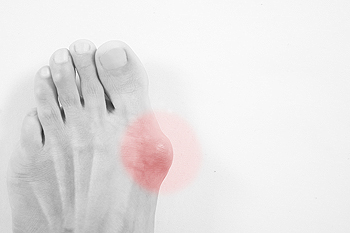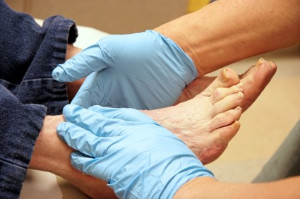Connect With Us
Blog
Items filtered by date: January 2023
Why Your Toes May Hurt

Toes are tiny parts of the body but when there is something wrong, the pain can be substantial. Nerve damage can be the cause of pain in the foot or big toe. Peripheral neuropathy is a condition that results from damage to the peripheral nerves and can cause numbness, pain, and weakness in the feet and toes. While it can be hard to figure out if this is going on, some things to look for include a slow but continual onset of numbness, a pins and needles feeling, or sharp, jabbing, or shooting pains in the feet that can spread to the toes. Additionally, one can suffer from a lack of coordination and falling as peripheral neuropathy can cause muscle weakness and paralysis. There are a host of causes for peripheral neuropathy, including but not limited to diabetes, autoimmune diseases, and infections. If you experience any of the symptoms described, it is important for you to see a podiatrist as soon as possible to get a proper diagnosis and treatment.
Toe pain can disrupt your daily activities. If you have any concerns, contact one of our podiatrists of New England Foot and Ankle. Our doctors can provide the care you need to keep you pain-free and on your feet.
What Causes Toe Pain?
Most severe toe pain is caused due to a sports injury, trauma from dropping something heavy on the toe, or bumping into something rigid. Other problems can develop over time for various reasons.
Toe pain can be caused by one or more ailments. The most common include:
- Trauma
- Sports injury
- Wearing shoes that are too tight
- Arthritis
- Gout
- Corns and calluses
- Hammertoe
- Bunions
- Blisters
- Ingrown toenails
- Sprains
- Fractures (broken bones)
- Dislocations
When to See a Podiatrist
- Severe pain
- Persistent pain that lasts more than a week
- Signs of infection
- Continued swelling
- Pain that prevents walking
Diagnosis
In many cases the cause of toe pain is obvious, but in others, a podiatrist may want to use more advanced methods to determine the problem. These can range from simple visual inspections and sensation tests to X-rays and MRI scans. Prior medical history, family medical history, and any recent physical traumatic events will all be taken into consideration for a proper diagnosis.
Treatment
Treatments for toe pain and injuries vary and may include shoe inserts, padding, taping, medicines, injections, and in some cases, surgery. If you believe that you have broken a toe, please see a podiatrist as soon as possible.
If you have any questions please feel free to contact one of our offices located in Chelmsford and Newburyport, MA . We offer the newest diagnostic tools and technology to treat your foot and ankle needs.
Wounds That Don't Heal Need to Be Checked
Relief From Bunions

A bunion is a noticeable foot condition. It is a hard lump that develops on the base of the big toe, and if not promptly treated, it may cause the other toes to shift toward each other. It is a common condition that can happen from wearing shoes that do not have ample room for the toes to move freely. As the bunion becomes larger, corns may form on the side of the bunion as it touches the shoe. Genetic factors may contribute to a bunion, and surgery may be an option for permanent removal. A bunion can be uncomfortable and may cause arthritis to develop. Additionally, as it grows, it may become swollen and red, likely causing the need to purchase larger shoes. Relief may be found when the correct shoe size is worn, and a protective pad is put over the bunion to reduce friction from shoes. Bunions are treated by a podiatrist, and it is strongly urged that you contact this type of doctor to determine what the best treatment is for you.
If you are suffering from bunion pain, contact one of our podiatrists of New England Foot and Ankle. Our doctors can provide the care you need to keep you pain-free and on your feet.
What Is a Bunion?
Bunions are painful bony bumps that usually develop on the inside of the foot at the joint of the big toe. As the deformity increases over time, it may become painful to walk and wear shoes. Women are more likely to exacerbate existing bunions since they often wear tight, narrow shoes that shift their toes together. Bunion pain can be relieved by wearing wider shoes with enough room for the toes.
Causes
- Genetics – some people inherit feet that are more prone to bunion development
- Inflammatory Conditions - rheumatoid arthritis and polio may cause bunion development
Symptoms
- Redness and inflammation
- Pain and tenderness
- Callus or corns on the bump
- Restricted motion in the big toe
In order to diagnose your bunion, your podiatrist may ask about your medical history, symptoms, and general health. Your doctor might also order an x-ray to take a closer look at your feet. Nonsurgical treatment options include orthotics, padding, icing, changes in footwear, and medication. If nonsurgical treatments don’t alleviate your bunion pain, surgery may be necessary.
If you have any questions, please feel free to contact one of our offices located in Chelmsford and Newburyport, MA . We offer the newest diagnostic and treatment technologies for all your foot care needs.
Foot Pain Relief During Pregnancy

Foot pain can be common among pregnant women. This may be a result of the added weight that is gained from the growing fetus, and the feet may become swollen and achy. There are simple methods that can be implemented which can provide moderate relief. Elevating the feet as often as possible and avoiding standing for long periods at a time are generally successful in controlling foot pain from pregnancy. Many women enjoy getting foot massages during their pregnancy, and performing specific stretches can help aching feet. Additionally, it is beneficial to wear shoes that have a lower heel and are comfortable, and wearing cotton socks may help the feet to breathe. Pregnancy can bring joy and happiness, and it is suggested that a podiatrist be consulted who can treat existing foot pain, allowing fuller enjoyment during this time.
Pregnant women with swollen feet can be treated with a variety of different methods that are readily available. For more information about other cures for swollen feet during pregnancy, consult with one of our podiatrists from New England Foot and Ankle. Our doctors will attend to all of your foot and ankle needs.
What Foot Problems Can Arise During Pregnancy?
One problem that can occur is overpronation, which occurs when the arch of the foot flattens and tends to roll inward. This can cause pain and discomfort in your heels while you’re walking or even just standing up, trying to support your baby.
Another problem is edema, or swelling in the extremities. This often affects the feet during pregnancy but tends to occur in the later stages.
How Can I Keep My Feet Healthy During Pregnancy?
- Wearing orthotics can provide extra support for the feet and help distribute weight evenly
- Minimize the amount of time spent walking barefoot
- Wear shoes with good arch support
- Wear shoes that allow for good circulation to the feet
- Elevate feet if you experience swelling
- Massage your feet
- Get regular, light exercise, such as walking, to promote blood circulation to the feet
If you have any questions please feel free to contact one of our offices located in Chelmsford and Newburyport, MA . We offer the newest diagnostic and treatment technologies for all your foot and ankle needs.
What Is the Subtalar Joint?

Many individuals who are serious about taking care of their feet will also take the necessary steps to learn about the biomechanics of the feet. Knowing more about how the foot functions can help us to better protect the feet. For example, the subtalar joint is something important to be aware of because it serves important functions. The subtalar joint is formed between two very important bones, the talus, and calcaneus. The subtalar joint, as a unit, is composed of both posterior and anterior joints. This joint is responsible for many different kinds of movements. For example, the subtalar joint facilitates, in large part, both supination and pronation. Therefore, the importance of taking care of the subtalar joint can not be overstated. Contact a podiatrist today if you are interested in learning more about foot biomechanics.
If you have any concerns about your feet, contact one of our podiatrists from New England Foot and Ankle. Our doctors can provide the care you need to keep you pain-free and on your feet.
Biomechanics in Podiatry
Podiatric biomechanics is a particular sector of specialty podiatry with licensed practitioners who are trained to diagnose and treat conditions affecting the foot, ankle and lower leg. Biomechanics deals with the forces that act against the body, causing an interference with the biological structures. It focuses on the movement of the ankle, the foot and the forces that interact with them.
A History of Biomechanics
- Biomechanics dates back to the BC era in Egypt where evidence of professional foot care has been recorded.
- In 1974, biomechanics gained a higher profile from the studies of Merton Root, who claimed that by changing or controlling the forces between the ankle and the foot, corrections or conditions could be implemented to gain strength and coordination in the area.
Modern technological improvements are based on past theories and therapeutic processes that provide a better understanding of podiatric concepts for biomechanics. Computers can provide accurate information about the forces and patterns of the feet and lower legs.
Understanding biomechanics of the feet can help improve and eliminate pain, stopping further stress to the foot.
If you have any questions please feel free to contact one of our offices located in Chelmsford and Newburyport, MA . We offer the newest diagnostic and treatment technologies for all your foot and ankle needs.
It's Time for Beautiful Feet
Why Diabetics Have to Care for Their Feet

Individuals who suffer from diabetes often have to take extra special care of different parts of their body. This is because diabetes makes the human body suffer from nerve damage, among many different things. However, nerve damage in the feet is often one of the most serious effects of having diabetes. Due to the nerve damage in the feet, many diabetics might experience some loss of feeling in the feet. As a result, diabetics ought to take extra special care of their feet because this lack of feeling may result in unnoticed afflictions of the foot if not closely monitored. Diabetics can make a point of examining their feet to ensure that they are not missing any signs of a foot condition. For example, performing a simple foot examination can improve the extent to which an individual is monitoring and checking for signs of damage to their feet. If you suffer from diabetes, contact a podiatrist for help today.
Diabetic foot care is important in preventing foot ailments such as ulcers. If you are suffering from diabetes or have any other concerns about your feet, contact one of our podiatrists from New England Foot and Ankle. Our doctors can provide the care you need to keep you pain-free and on your feet.
Diabetic Foot Care
Diabetes affects millions of people every year. The condition can damage blood vessels in many parts of the body, especially the feet. Because of this, taking care of your feet is essential if you have diabetes, and having a podiatrist help monitor your foot health is highly recommended.
The Importance of Caring for Your Feet
- Routinely inspect your feet for bruises or sores.
- Wear socks that fit your feet comfortably.
- Wear comfortable shoes that provide adequate support.
Patients with diabetes should have their doctor monitor their blood levels, as blood sugar levels play such a huge role in diabetic care. Monitoring these levels on a regular basis is highly advised.
It is always best to inform your healthcare professional of any concerns you may have regarding your feet, especially for diabetic patients. Early treatment and routine foot examinations are keys to maintaining proper health, especially because severe complications can arise if proper treatment is not applied.
If you have any questions please feel free to contact one of our offices located in Chelmsford and Newburyport, MA . We offer the newest diagnostic and treatment technologies for all your foot and ankle needs.
Blog Archives
- April 2025
- March 2025
- February 2025
- January 2025
- December 2024
- November 2024
- October 2024
- September 2024
- August 2024
- July 2024
- June 2024
- May 2024
- April 2024
- March 2024
- February 2024
- January 2024
- December 2023
- November 2023
- October 2023
- September 2023
- August 2023
- July 2023
- June 2023
- May 2023
- April 2023
- March 2023
- February 2023
- January 2023
- December 2022
- November 2022
- October 2022
- September 2022
- August 2022
- July 2022
- June 2022
- May 2022
- April 2022
- March 2022
- February 2022
- January 2022
- December 2021
- November 2021
- October 2021
- September 2021
- August 2021
- July 2021
- June 2021
- May 2021
- April 2021
- March 2021
- February 2021
- January 2021
- December 2020
- November 2020
- October 2020
- September 2020
- August 2020
- July 2020
- June 2020
- May 2020
- April 2020
- March 2020
- February 2020
- January 2020
- December 2019
- November 2019
- October 2019
- September 2019
- August 2019
- July 2019
- June 2019
- May 2019
- April 2019
- March 2019
- February 2019
- January 2019
- December 2018
- November 2018
- October 2018
- September 2018
- August 2018
- July 2018
- June 2018
- May 2018
- April 2018
- March 2018
- February 2018
- January 2018
- December 2017
- November 2017
- October 2017
- September 2017
- August 2017
- July 2017
- June 2017
- May 2017
- April 2017
- March 2017
- February 2017
- March 2016


